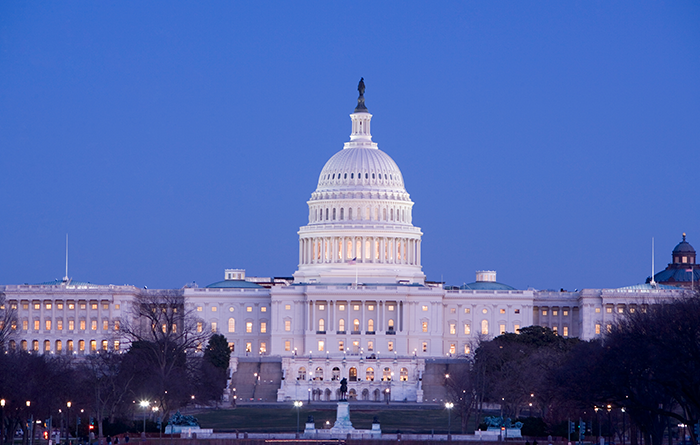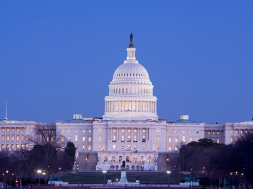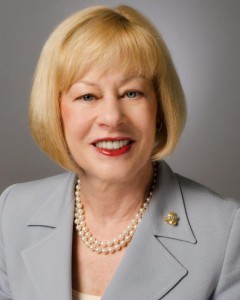
Washington News Brief
By Sharon H. Bob, Ph.D., Higher Education Specialist, Powers Pyles Sutter and Verville, PC
FSA announces launch of the FSA Partner Connect website
On March 28, 2021, Federal Student Aid (FSA) announced the launch of the FSA Partner Connect website at: https://fsapartners.ed.gov/home/. The Information for Financial Aid Professionals (IFAP) website has been retired. Users visiting the IFAP website home page will be redirected to https://fsapartners.ed.gov/knowledge-center.
A copy of the electronic announcement is found at: https://fsapartners.ed.gov/knowledge-center/library/electronic-announcements/2021-03-28/next-gen-fsa-fsa-partner-connect-and-knowledge-center-now-available-ea-id-general-21-20
Department announces relief for borrowers with total and permanent disabilities during the COVID-19 emergency
On March 29, 2021, the Department of Education announced relief for certain borrowers who have received student loan discharges due to total and permanent disability. These changes will ensure no borrowers are at risk of having their loans reinstated, which would mean they would have to repay their debt, for failure to provide earnings information during the COVID-19 emergency.
Current regulations require borrowers who receive this discharge to be subject to a three-year monitoring period. During the monitoring period, borrowers must provide the Department with information about their earnings from employment. As of March 29, 2021, the Department will not require borrowers who receive a total and permanent disability discharge to submit earnings documentation for the duration of the COVID-19 emergency. This change will be retroactive to March 13, 2020, the start of the COVID-19 national emergency.
A copy of the press release is found at: https://www.ed.gov/news/press-releases/education-department-announces-relief-student-loan-borrowers-total-and-permanent-disabilities-during-covid-19-emergency
Department announces expansion of COVID-19 emergency flexibilities for FFEL loans
On March 30, 2021, the Department of Education announced an expansion of the pause on federal student loan interest and collections to all defaulted loans in the Federal Family Education Loan (FFEL) Program. This action will help 1.14 million borrowers who defaulted on their FFEL loans that are privately held. This action will protect the borrowers who were at risk of having their federal tax refunds seized to repay a defaulted loan. The relief will be made retroactive to March 13, 2020, the start of the COVID-19 national emergency. The Department will work to return any tax refunds seized or wages garnished over the past year.
Secretary of Education Miguel Cardona said: “Our goal is to enable those borrowers who are struggling in default to get the same protections previously made available to tens of millions of other borrowers to help weather the uncertainty of the pandemic.”
A copy of the press release is found at: https://www.ed.gov/news/press-releases/department-education-announces-expansion-covid-19-emergency-flexibilities-additional-federal-student-loans-default
IRS announces that emergency financial aid grants are not taxable
On March 30, 2021, the Internal Revenue Service (IRS) issued guidance on how students and institutions should report the emergency financial aid grants under HEERF funding. The announcement said students should not include the emergency financial aid grants in their gross income. Also, students should not reduce an amount of qualified tuition and related expenses by the amount of an emergency financial aid grant. Because students should not include the emergency financial aid grants in their gross income, institutions of higher education area not required to file or furnish Forms 1099-MISC reporting the grants made available by the Coronavirus Aid, Relief, and Economic Security Act (CARES Act) or the COVID-related Tax Relief Act (COVID Relief Act) and do not need to report the grants in Box 5 of Form 1098-T.
A copy of the IRS announcement is found at: https://www.irs.gov/newsroom/emergency-aid-granted-to-students-due-to-covid-are-not-taxable
Department’s OIG announces the availability of HEERF compliance guide for proprietary schools
On March 31, 2021, the Department of Education’s Office of Inspector General (OIG) announced the availability of the “Guide for Compliance Attestation Engagements of Proprietary Schools Expending Higher Education Emergency Relief Fund Grants (Guide),” which provides guidance for compliance attestation engagements of proprietary schools that received Higher Education Emergency Relief Fund (HEERF) grants. As a condition of the HEERF grant program awards, a proprietary school must have a compliance audit conducted of its administration of the HEERF grant programs for any fiscal year, during which eligible schools expend $500,000 or more in total HEERF grant program funds or are on Heightened Cash Monitoring 1 or 2 in a fiscal year in which it expended any HEERF grant funds.
A copy of the announcement, which includes the link to the Guide, is found at: https://fsapartners.ed.gov/knowledge-center/library/electronic-announcements/2021-03-31/availability-guide-compliance-attestation-engagements-proprietary-schools-expending-higher-education-emergency-relief-fund-grants-ea-id-general-21-21
ED discharges over $1.6 billion in HBCU capital finance debt
On April 2, 2021, the Department of Education announced that it recently discharged about $1.6 billion of debt provided to Historically Black Colleges and Universities (HBCUs) that participate in the HBCU Capital Financing Program. Since 1994, the HBCU Capital Financing Program has provided low-cost loans to finance and refinance infrastructure improvements at the nation’s HBCUs. With this action, 45 HBCUs will receive debt relief.
A copy of the press release is found at: https://www.ed.gov/news/press-releases/department-education-discharges-over-16-billion-hbcu-capital-finance-debt
Secretary Cardona joins roundtable discussion on student loan debt
On April 2, 2021, Secretary of Education Miguel Cardona joined a roundtable discussion to listen as student loan borrowers and advocates shared their stories about the impact student loan debt has had on their lives. Senate Majority Leader Chuck Schumer (D-NY) and Senator Elizabeth Warren (D-MA) also joined the roundtable discussion. Secretary Cardona said:
“What I am hearing from you all is not only that there is this cloud hanging over your heads, but also that there is this great emotional impact which has severely interrupted your lives. This burden has created a generational impact of distress.”
A copy of the press release is found at: https://www.ed.gov/news/press-releases/secretary-education-joins-senator-elizabeth-warren-and-senator-chuck-schumer-roundtable-discussion-student-loan-borrowers-and-advocates
ED announces comprehensive review of the Title IX rules
On April 6, 2021, the Department of Education’s Office for Civil Rights (OCR) announced a comprehensive review of the Title IX rules. In a letter to students, educators, and other stakeholders, OCR outlined plans to solicit the public’s input on the regulations, ultimately leading to possible revisions through a notice of proposed rulemaking. A public hearing will be held in the coming weeks, but has not been announced. OCR will also be releasing new guidance in the form of Q&As that will advise colleges and universities how the agency plans to enforce the current Title IX rules while the review is in progress. Secretary of Education Miguel Cardona said:
“Building educational environments free from discrimination where our nation’s students can grow and thrive is a top priority of the Biden-Harris Administration. Today’s action is the first step in making sure that the IX regulations are effective and are fostering safe learning environments for our students while implementing fair processes. Sexual harassment and other forms of sex discrimination, including in extracurricular activities and other educational settings, threaten access to education for students of all ages.”
A copy of the press release is found at: https://www.ed.gov/news/press-releases/department-educations-office-civil-rights-launches-comprehensive-review-title-ix-regulations-fulfill-president-bidens-executive-order-guaranteeing-educational-environment-free-sex-discrimination
A copy of the letter sent to the higher education community is found at:
https://www2.ed.gov/about/offices/list/ocr/correspondence/stakeholders/20210406-titleix-eo-14021.pdf
OMB releases “skinny budget” for FY 2022
On April 9, 2022, the White House Office of Management and Budget (OMB) released its “skinny budget,” which is the President’s budget request for FY 2022. The FY 2022 budget proposal includes $102.8 billion for the Department of Education, which is a 41% increase over last year’s FY 2021 funding. Details are limited for higher education, but the request includes additional funds for the Pell Grant Program and for Historically Black Colleges and Schools (HBCUs), Tribally Controlled Colleges and Universities (TCCUs), and Minority Serving Institutions (MSIs) as well as community colleges.
To lower barriers for low- and middle-income students pursing higher education, the discretionary request increases the maximum Pell Grant by $400, the largest one-time increase since 2009. For award year 2021-2022, the Pell Grant maximum award was increased $150 to $6,495. The discretionary request of an additional $3 billion in Pell Grants would ensure “DREAMers,” students who came to the United States as children and are Deferred Action for Childhood Arrivals recipients, are eligible for Pell Grants if they meet the standard requirements for Pell Grants.
The proposal also increases funding for HBCUs, TCCUs, MSIs, and community colleges. The discretionary request provides an increase of more than $600 million over the FY 2021 enacted levels for these programs. These funds would support programs that provide additional assistance for disadvantaged students, including those at community colleges, to ensure they succeed in and graduate from college.
Twenty-three organizations write to Secretary Cardona urging relief for individuals seeking borrower defense to repayment
On April 13, 2021, 23 organizations sent a letter to Secretary of Education Miguel Cardona urging him to address the borrower defense to repayment crisis. They asked the Secretary to provide relief to borrowers who were defrauded and who were failed by the Department under then-Secretary Betsy DeVos. The letter noted that by December 2019, the number of borrowers awaiting adjudication had increased to 200,000 from 17,000 in January 2017. The Department’s decisions under Secretary DeVos led to a flood of “perfunctory denials” because the system churned out denials by ignoring ample evidence. The letter went on to say that the system also “systemically disregarded relevant evidence of school misconduct.”
The organizations called on the Secretary to:
- Provide relief to borrowers who have been failed by the broken process of the last four years;
- Create a fair and efficient adjudication process for new borrower defense claims;
- Acknowledge that the individual application process, which forces students to assert legal arguments and provide extensive documentation, has prevented the most “vulnerable defrauded borrowers from obtaining relief;” and
- Take aggressive measures to more carefully safeguard Title IV funds and protect students from wrongdoing in the future.
A copy of the letter is found at: https://www.nclc.org/images/pdf/student_loans/Cardona_Borrower_Defense_Ltr.pdf
FSA announces 2021 Federal Student Aid Training Conference
On April 15, 2021, Federal Student Aid (FSA) announced that the 2021 Federal Student Aid Conference will be held on Nov. 30 – Dec. 3, 2021 and will be held virtually. FSA will continue to post additional information during the summer at: https://fsapartners.ed.gov/knowledge-center/library/electronic-announcements/2021-04-15/2021-federal-student-aid-training-conference-we-are-virtual-again-ea-id-general-21-23
GAO releases report on how CARES Act funds are being used
On April 20, 2021, the Government Accountability Office (GAO) released a new report on how institutions have utilized funding provided under the Coronavirus Aid, Relief, and Economic Security (CARES) Act for emergency funds to students. As of November 2020, the Department of Education had awarded $6.19 billion to 4,778 educational institutions that applied for emergency student aid funds from the Higher Education Emergency Relief Fund (HEERF). Of those funds, $3.1 billion was allocated to public four-year institutions, $1.3 billion to public two-year institutions, and $1.1 billion to private nonprofit four-year schools. Within the total pool of funding, $372.8 million and $167.7 million were respectively allocated to private for-profit two- and four-year institutions.
As of November 2020, institutions had drawn down about 90% or $5.6 billion of their HEERF student aid funds, with the average grant amount per student being about $830. About 70% of institutions had drawn down all of their student aid funds, and an additional 24% of institutions had drawn down at least half.
A copy of the GAO report is found at: https://www.gao.gov/products/gao-21-312r?source=email
Senate HELP Committee approves nomination of James Kvaal to serve as Under Secretary of Education
On April 21, 2021, the Senate Health, Education, Labor, and Pensions (HELP) Committee advanced the nomination of James Kvaal to be Under Secretary of Education by a bipartisan vote of 13-9. In addition to every Democrat on the Committee, Senators Richard Burr (R-NC), Susan Collins (R-ME), Lisa Murkowski (R-AK), Bill Cassidy (R-LA), Roger Marshall (R-KS), Tim Scott (R-SC), Mitt Romney (R-UT), and Jerry Moran (R-KS) voted to advance Mr. Kvaal’s nomination.
At the hearing, Chairman of the Senate HELP Committee Patty Murray (D-WA) said: “I have no doubt that when confirmed, Mr. Kvaal will fight for students, and against special interests – because it’s what he has always done. Mr. Kvaal’s record shows he is clearly qualified to serve as Under Secretary of Education, and I’m pleased to support his nomination.”
Mr. Kvaal’s nomination now heads to the Senate for consideration, although a timeline has not been set.
A copy of Senator Murray’s press release is found at: https://www.help.senate.gov/chair/newsroom/press/help-committee-votes-to-advance-labor-and-education-nominees-julie-su-cindy-marten-james-kvaal-
House Democrats introduce bill to regulate for-profit conversion
On April 21, 2021, Representative Lucy McBath (D-GA), along with Representatives Sara Jacobs (D-CA) and Kathy Manning (D-NC) as co-sponsors, introduced H.R. 2700, the For-Profit College Conversion Accountability Act, which sets forth the process of converting a for-profit institution to a nonprofit institution of higher education. The bill was introduced following an April 20, 2021, hearing held by the House Education and Labor Committee, which addressed the conversion process.
The legislation would create eligibility requirements, require nonprofit conversions to be made public in advance, prevent institutions from marketing themselves as nonprofit institutions until the Department of Education grants approval, and create an office within the Department of Education to monitor conversions and determine institutions’ nonprofit eligibility.
Representative McBath said in a press release: “In my own district, we saw first-hand what happens when an institution of higher education attempts to evade accountability. The closure of Argosy University in 2019, after months of misleading students and an attempt to convert to nonprofit status, ripped off thousands of students and veterans, leaving them with untransferable credits, huge amounts of student debt, and degrees that aren’t worth anything.”
A copy of Representative McBath’s press release is found at: https://mcbath.house.gov/press-releases?ID=C20242A6-BB20-4B0C-9762-A73AC2295059.
The hearing held on April 20, 2021 by the House Education and Labor Committee was titled, “For-Profit College Conversions: Examining Ways to Improve Accountability and Prevent Fraud.” In his opening statement, Chairman Bobby Scott (D-VA) expressed his view that there is a need for greater oversight to protect students and taxpayers from for-profit institutions that make the transition to traditional nonprofit institutions. He cited data from the U.S. Government Accountability Office (GAO) that 59 institutions have transitioned from for-profit to nonprofit status in the last decade. He stated that in one-third of those transitions, the for-profit owners or officials held leadership roles in the nonprofit buyer. Chairman Scott noted that due to the lack of oversight from the U.S. Department of Education, many of the transitions did not receive proper investigation for misconduct and some for-profit institutions have transitioned to nonprofit institutions in name only.
Ranking Member Virginia Foxx (R-NC) said in her opening statement that the nation’s postsecondary education system is in crisis with declining high school graduation rates, increasing skill-gaps, COVID-19 learning losses, increasing college costs, federal student loan debt, and an infiltration by China on U.S. college campuses. She expressed disappointment that these issues were not being addressed during the hearing and instead there was a focus on for-profit colleges converting to nonprofit status, which only impacts 0.14% of such colleges per year.
The archived webcast can be found at: https://edlabor.house.gov/hearings/for-profit-college-conversions-examining-ways-to-improve-accountability-and-prevent-fraud
Senator Sanders and Representative Jayapal introduce free community college bill; Other House and Senate Democrats introduce similar bills
On April 21, 2021, Senator Bernie Sanders (I-VT) and Representative Pramila Jayapal (D-WA) introduced the College for All Act, which would make community colleges tuition free for all students and would make public colleges and universities tuition-free for all students from families with annual incomes below $125,000. The bill would also double the maximum Pell Grant from $6,495 to $12,990.
The bill would:
- Create a new federal-state partnership where the federal government would cover 75% of the costs and states would contribute the remaining 25%. In exchange for the funding, states and localities would have to sustain and expand existing tuition-free programs; and
- Authorize $10 billion in federal funding each year to cover student support programs at colleges and universities across the country.
A copy of Senator Sanders’ press release is found at: https://www.sanders.senate.gov/press-releases/college-for-all-act-introduced/
On April 27, 2021, Senator Tammy Baldwin (D-WI) and Congressman Andy Levin (D-MI) reintroduced America’s College Promise Act, which would create a new partnership between the federal government and states to help them waive tuition for eligible student residents for two years of community and technical college programs.
A copy of Senator Baldwin’s press release is found at: https://www.baldwin.senate.gov/press-releases/americas-college-promise-act-2021
Related to these bills, Senator Brian Schatz (D-HI) and Congressman Mark Pocan (D-WI) reintroduced the Debt-Free College Act, which would establish a federal-state partnership that provides a dollar-for-dollar federal match to state higher education appropriations in exchange for a state commitment to pay for the full cost of attendance without a student having to take on debt.
A copy of Senator Schatz’s press release is found at: https://www.schatz.senate.gov/press-releases/schatz-pocan-reintroduce-legislation-to-end-student-loan-debt-crisis-2021
SHARON H. BOB PH.D., Higher Education Specialist on Policy and Regulation, is a member of the Education Group at the Washington, DC law firm of Powers Pyles Sutter & Verville, PC. Dr. Bob advises all sectors of higher education regarding strategic issues pertaining to their participation in the federal student financial assistance programs, accreditation, licensure, education tax benefits, and related regulatory matters.
Contact Information: Sharon H. Bob, Ph.D. // Higher Education Specialist // Powers Pyles Sutter and Verville, PC // 1501 M Street, NW, Suite 700, Washington, DC 20005 // 202-872-6772 // Sharon.Bob@PowersLaw.com // http://www.powerslaw.com

